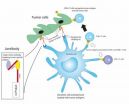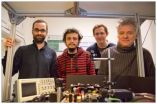(Press-News.org) A novel approach to cancer immunotherapy – strategies designed to induce the immune system to attack cancer cells – may provide a new and cost-effective weapon against some of the most deadly tumors, including ovarian cancer and mesothelioma. Investigators from the Massachusetts General Hospital (MGH) Vaccine and Immunotherapy Center report in the Journal of Hematology & Oncology that a protein engineered to combine a molecule targeting a tumor-cell-surface antigen with another protein that stimulates several immune functions prolonged survival in animal models of both tumors.
"Some approaches to creating cancer vaccines begin by extracting a patient's own immune cells, priming them with tumor antigens and returning them to the patient, a process that is complex and expensive," says Mark Poznansky, MD, PhD, director of the MGH Vaccine and Immunotherapy Center and senior author of the report. "Our study describes a very practical, potentially broadly applicable and low-cost approach that could be used by oncologists everywhere, not just in facilities able to harvest and handle patient's cells."
The MGH team's vaccine stimulates the patient's own dendritic cells, a type of immune cell that monitors an organism's internal environment for the presence of viruses or bacteria, ingests and digests pathogens encountered, and displays antigens from those pathogens on their surface to direct the activity of other immune cells. As noted above, existing cancer vaccines that use dendritic cells require extracting cells from a patient's blood, treating them with an engineered protein or nucleic acid that combines tumor antigens with immune-stimulating molecules, and returning the activated dendritic cells to the patient.
The approach developed by the MGH team starts with the engineered protein, which in this case fuses an antibody fragment targeting a protein called mesothelin – expressed on the surface of such tumors as mesothelioma, ovarian cancer and pancreatic cancer – to a protein from the tuberculosis bacteria that stimulates the activity of dendritic and other immune cells. In this system, the dendritic cells are activated and targeted against tumor cells while remaining inside the patient's body.
In the experiments described in the paper, the MGH team confirmed that their mesothelin-targeting fusion protein binds to mesothelin on either ovarian cancer or mesothelioma cells, activates dendritic cells, and enhances the cells' processing and presentation of several different tumor antigens, inducing a number of T-cell-based immune responses. In mouse models of both tumors, treatment with the fusion protein significantly slowed tumor growth and extended survival, probably through the activity of cytotoxic CD8 T cells.
"Many patients with advanced cancers don't have enough functioning immune cells to be harvested to make a vaccine, but our protein can be made in unlimited amounts to work with the immune cells patients have remaining," explains study co-author Jeffrey Gelfand, MD, senior scientist at the Vaccine and Immunotherapy Center. "We have created a potentially much less expensive approach to making a therapeutic cancer vaccine that, while targeting a single tumor antigen, generates an immune response against multiple antigens. Now if we can combine this with newly-described ways to remove the immune system's "brakes" – regulatory functions that normally suppress persistent T-cell activity – the combination could dramatically enhance cancer immunotherapy."
Poznansky adds that the tumors that might be treated with the mesothelin-targeting vaccine – ovarian cancer, pancreatic cancer and mesothelioma – all have poor survival rates. "Immunotherapy is generally nontoxic, so this vaccine has the potential of safely extending survival and reducing the effects of these tumors, possibly even cutting the risk of recurrence. We believe that this approach could ultimately be used to target any type of cancer and are currently investigating an improved targeting approach using personalized antigens." The MGH team just received a two-year grant from the Department of Defense Congressionally Directed Medical Research Program to continue their research.
INFORMATION:
Poznansky is an associate professor of Medicine, and Gelfand is a clinical professor of Medicine at Harvard Medical School. Jianping Yuan, PhD, of the MGH Vaccine and Immunotherapy Center (VIC) is the lead author of the Journal of Hematology and Oncology report. Additional co-authors include Pierre LeBlanc, PhD, Satoshi Kashiwagi MD, PhD, Timothy Brauns, and Svetlana Korochkina, PhD, MGH VIC; and Nathalie Scholler, MD, PhD, University of Pennsylvania School of Medicine.
The authors dedicate their report to Janet Gelfand, wife of Jeffrey Gelfand, who died of ovarian cancer in 2006 and inspired their investigation. In her honor they have named their tumor-targeting fusion protein Jantibody. Support for the study includes grants from the Edmund Lynch Jr. Cancer Fund, Arthur Luxenberg Esq., Perry Weitz Esq., the VIC Mesothelioma Research and Resource Program, and the Friends of VIC Fund.
Massachusetts General Hospital, founded in 1811, is the original and largest teaching hospital of Harvard Medical School. The MGH conducts the largest hospital-based research program in the United States, with an annual research budget of more than $775 million and major research centers in AIDS, cardiovascular research, cancer, computational and integrative biology, cutaneous biology, human genetics, medical imaging, neurodegenerative disorders, regenerative medicine, reproductive biology, systems biology, transplantation biology and photomedicine.
Novel cancer vaccine holds promise against ovarian cancer, mesothelioma
Antigen-targeting fusion protein should be less expensive, more accessible than current approaches
2014-03-05
ELSE PRESS RELEASES FROM THIS DATE:
Hungry for 'likes': Frequent Facebook use linked to eating disorder risk, study finds
2014-03-05
TALLAHASSEE, Fla. — Frequent Facebook users might be sharing more than party pictures, vacation videos and shameless selfies — they also share a greater risk of eating disorders, according to a new study led by Florida State University researchers.
Psychology Professor Pamela K. Keel studied 960 college women and found that more time on Facebook was associated with higher levels of disordered eating. Women who placed greater importance on receiving comments and "likes" on their status updates and were more likely to untag photos of themselves and compare their own photos ...
Prenatal nicotine exposure may lead to ADHD in future generations
2014-03-05
TALLAHASSEE, Fla. — Prenatal exposure to nicotine could manifest as attention deficit hyperactivity disorder in children born a generation later, according to a new study by Florida State University College of Medicine researchers.
Professors Pradeep G. Bhide and Jinmin Zhu have found evidence that ADHD associated with nicotine can be passed across generations. In other words, your child's ADHD might be an environmentally induced health condition inherited from your grandmother, who may have smoked cigarettes during pregnancy a long time ago. And the fact that you never ...
A single gene, doublesex, controls wing mimicry in butterflies
2014-03-05
A single gene regulates the complex wing patterns, colors and structures required for mimicry in swallowtail butterflies, report scientists from the University of Chicago, March 5 in Nature. Surprisingly, the gene described, doublesex, is already well-known for its critical role in sexual differentiation in insects.
"Conventional wisdom says that it should be multiple genes working together to control the whole wing pattern of a butterfly," said Marcus Kronforst, Neubauer Family Assistant Professor of Ecology & Evolution at the University of Chicago and senior author ...
Ultra sensitive detection of radio waves with lasers
2014-03-05
Radio waves are used for many measurements and applications, for example, in communication with mobile phones, MRI scans, scientific experiments and cosmic observations. But 'noise' in the detector of the measuring instrument limits how sensitive and precise the measurements can be. Now researchers at the Niels Bohr Institute have developed a new method where they can avoid noise by means of laser light and can therefore achieve extreme precision of measurements. The results are published in the prestigious scientific journal, Nature.
'Noise' in the detector of a measuring ...
Livestock can produce food that is better for the people and the planet
2014-03-05
With one in seven humans undernourished, and with the challenges of population growth and climate change, the need for efficient food production has never been greater. Eight strategies to cut the environmental and economic costs of keeping livestock, such as cows, goats and sheep, while boosting the quantity and quality of the food produced have been outlined by an international team of scientists.
The strategies to make ruminant - cud-chewing - livestock a more sustainable part of the food supply, led by academics at the University of Bristol's School of Veterinary ...
ALS-linked gene causes disease by changing genetic material's shape
2014-03-05
Johns Hopkins researchers say they have found one way that a recently discovered genetic mutation might cause two nasty nervous system diseases. While the affected gene may build up toxic RNA and not make enough protein, the researchers report, the root of the problem seems to be snarls of defective genetic material created at the mutation site.
The research team, led by Jiou Wang, Ph.D., an assistant professor of biochemistry and molecular biology and neuroscience at the Johns Hopkins University School of Medicine, reports its finding March 5 on the journal Nature's ...
Study aims to define risk factors for falls in post-menopausal women
2014-03-05
ROSEMONT, Ill.–A new study appearing in the March issue of the Journal of Bone and Joint Surgery (JBJS) showed that women with distal radius (wrist) fractures had decreased strength compared to similar patients without fractures. This could explain why these women were more likely to fall and might sustain future fractures.
The investigators used a variety of balance and strength tests combined with patient-provided information about walking habits to evaluate the physical performance and risk of falls for post-menopausal women with and without previous wrist fractures. ...
UF researchers find drug therapy that could eventually reverse memory decline in seniors
2014-03-05
GAINESVILLE, Fla. — It may seem normal: As we age, we misplace car keys, or can't remember a name we just learned or a meal we just ordered. But University of Florida researchers say memory trouble doesn't have to be inevitable, and they've found a drug therapy that could potentially reverse this type of memory decline.
The drug can't yet be used in humans, but the researchers are pursuing compounds that could someday help the population of aging adults who don't have Alzheimer's or other dementias but still have trouble remembering day-to-day items. Their findings will ...
NASA sees Tropical Cyclone Faxai stretching out
2014-03-05
When a tropical cyclone becomes elongated it is a sign the storm is weakening. Imagery from NASA-NOAA's Suomi NPP satellite today revealed that wind shear was stretching out Tropical Cyclone Faxai and the storm was waning.
On March 5 at 1500 UTC/10 a.m. EST, Tropical Cyclone Faxai's center was located near 22.5 south and 155.2 east, about 699 nautical miles/804.4 miles/ 1,295 km west-northwest of Wake Island. According to the Joint Typhoon Warning Center or JTWC, Faxai's maximum sustained surface winds dropped to 50 knots/57.5 mph/92.6 kph. Faxai was moving to the northeast ...
UCSB study explores cocaine and the pleasure principle
2014-03-05
(Santa Barbara, Calif.) — On the other side of the cocaine high is the cocaine crash, and understanding how one follows the other can provide insight into the physiological effects of drug abuse. For decades, brain research has focused on the pleasurable effects of cocaine largely by studying the dopamine pathway. But this approach has left many questions unanswered.
So the Behavioral Pharmacology Laboratory (BPL) at UC Santa Barbara decided to take a different approach by examining the motivational systems that induce an animal to seek cocaine in the first place. Their ...
LAST 30 PRESS RELEASES:
Scientists show how to predict world’s deadly scorpion hotspots
ASU researchers to lead AAAS panel on water insecurity in the United States
ASU professor Anne Stone to present at AAAS Conference in Phoenix on ancient origins of modern disease
Proposals for exploring viruses and skin as the next experimental quantum frontiers share US$30,000 science award
ASU researchers showcase scalable tech solutions for older adults living alone with cognitive decline at AAAS 2026
Scientists identify smooth regional trends in fruit fly survival strategies
Antipathy toward snakes? Your parents likely talked you into that at an early age
Sylvester Cancer Tip Sheet for Feb. 2026
Online exposure to medical misinformation concentrated among older adults
Telehealth improves access to genetic services for adult survivors of childhood cancers
Outdated mortality benchmarks risk missing early signs of famine and delay recognizing mass starvation
Newly discovered bacterium converts carbon dioxide into chemicals using electricity
Flipping and reversing mini-proteins could improve disease treatment
Scientists reveal major hidden source of atmospheric nitrogen pollution in fragile lake basin
Biochar emerges as a powerful tool for soil carbon neutrality and climate mitigation
Tiny cell messengers show big promise for safer protein and gene delivery
AMS releases statement regarding the decision to rescind EPA’s 2009 Endangerment Finding
Parents’ alcohol and drug use influences their children’s consumption, research shows
Modular assembly of chiral nitrogen-bridged rings achieved by palladium-catalyzed diastereoselective and enantioselective cascade cyclization reactions
Promoting civic engagement
AMS Science Preview: Hurricane slowdown, school snow days
Deforestation in the Amazon raises the surface temperature by 3 °C during the dry season
Model more accurately maps the impact of frost on corn crops
How did humans develop sharp vision? Lab-grown retinas show likely answer
Sour grapes? Taste, experience of sour foods depends on individual consumer
At AAAS, professor Krystal Tsosie argues the future of science must be Indigenous-led
From the lab to the living room: Decoding Parkinson’s patients movements in the real world
Research advances in porous materials, as highlighted in the 2025 Nobel Prize in Chemistry
Sally C. Morton, executive vice president of ASU Knowledge Enterprise, presents a bold and practical framework for moving research from discovery to real-world impact
Biochemical parameters in patients with diabetic nephropathy versus individuals with diabetes alone, non-diabetic nephropathy, and healthy controls
[Press-News.org] Novel cancer vaccine holds promise against ovarian cancer, mesotheliomaAntigen-targeting fusion protein should be less expensive, more accessible than current approaches




